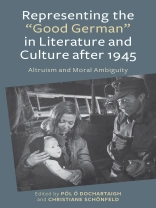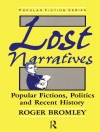Essays analyzing postwar literary, cultural, and historical representations of ‘good Germans’ during the Second World War and the Nazi period.
In the aftermath of the Second World War, both the allied occupying powers and the nascent German authorities sought Germans whose record during the war and the Nazi period could serve as a counterpoint to the notion of Germans asevil. That search has never really stopped. In the past few years, we have witnessed a burgeoning of cultural representations of this ‘other’ kind of Third Reich citizen – the ‘good German’ – as opposed to the committed Nazi or genocidal maniac. Such representations have highlighted individuals’ choices in favor of dissenting behavior, moral truth, or at the very least civil disobedience. The ‘good German’s’ counterhegemonic practice cannot negate or contradict the barbaric reality of Hitler’s Germany, but reflects a value system based on humanity and an ‘other’ ideal community.
This volume of new essays explores postwar and recent representations of ‘good Germans’ during the Third Reich, analyzing the logic of moral behavior, cultural and moral relativism, and social conformity found in them. It thus draws together discussions of the function and reception of ‘Good Germans’ in Germany and abroad.
Contributors: Eoin Bourke, Manuel Bragança, Maeve Cooke, Kevin De Ornellas, Sabine Egger, Joachim Fischer, Coman Hamilton, Jon Hughes, Karina von Lindeiner-Strásky, Alexandra Ludewig, Pól O Dochartaigh, Christiane Schönfeld, Matthias Uecker.
Pól O Dochartaigh is Professor of German and Dean of the Faculty of Arts at the University of Ulster, Northern Ireland. Christiane Schönfeld is Senior Lecturer in German and Head of the Department of German Studies at Mary Immaculate College, University of Limerick.
Cuprins
Introduction: Finding the ‘Good German’
Re-Presenting the Good Citizen: Philosophical Reflections – Maeve Cooke
‘Görings glorreichste Günstlinge’: The Portrayal of Wilhelm Furtwängler and Gustaf Gründgens as Good Germans in the West German Media since 1945 – Karina von Lindeiner-Strasky
From Hitler’s Champion to German of the Century: On the Representation and Re-invention of Max Schmeling – Jon Hughes
Wilhelm Krützfeld and Other ‘Good’ Constables in Police Station 16 in Hackescher Markt – Eoin Bourke
The ‘Good German’ between Silence and Artistic Deconstruction of an Inhumane World: Johannes Bobrowski’s ‘Mäusefest’ and ‘Der Tänzer Malige’ – Sabine Egger
Saints and Sinners: The Good German and Her Others in Heinrich Böll’s Gruppenbild mit Dame – Matthias Uecker
Being Human: Good Germans in Postwar German Film – Christiane Schönfeld
‘The Banality of Good’? Good Nazis in Contemporary German Film – Alexandra Ludewig
Memories of Good and Evil in Sophie Scholl – Die letzten Tage – Coman Hamilton
Deconstructing the ‘Good German’ in French Best-Sellers Published in the Aftermath of the Second World War – Manuel Braganca
Macbeth, Not Henry V: Shakespearean Allegory in the Construction of Vercors’s ‘Good German’ – Kevin De Ornellas
A Good Irish German: In Praise of Hugo Hamilton’s Mother – Joachim Fischer
Shades of Gray: The Beginnings of the Postwar Moral Compromise in Joseph Kanon’s The Good German – Pól O Dochartaigh
Filmography
Index












